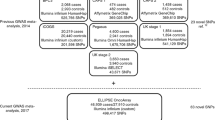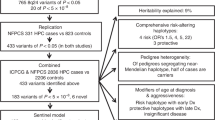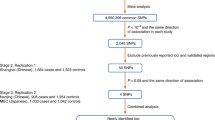Abstract
Epidemiological and twin studies have consistently demonstrated a strong genetic component to prostate cancer (PCa) susceptibility. To date, numerous linkage studies have been performed to identify chromosomal regions containing PCa susceptibility genes. Unfortunately, results from these studies have failed to form any obvious consensus regarding which regions are most likely to contain genes that may contribute to PCa predisposition. One plausible explanation for the difficulty in mapping susceptibility loci is the existence of considerable heterogeneity in the phenotype of PCa, with significant variation in clinical stage and grade of disease even among family members. To address this issue, we performed a genome-wide linkage scan on 71 informative families with two or more men with aggressive PCa. When only men with aggressive PCa were coded as affected, statistically significant evidence for linkage at chromosome 15q12 was detected (LOD=3.49; genome-wide p=0.005). Furthermore, the evidence for linkage increased when analyses were restricted to Caucasian–American pedigrees (n=65; LOD=4.05) and pedigrees with two confirmed aggressive cases (n=42, LOD=4.76). Interestingly, a 1-LOD support interval about our peak at 15q12 overlaps a region of suggestive linkage, 15q11, identified by a recent linkage study on 1,233 PCa families by the International Consortium for Prostate Cancer Genetics. Using a more rigid definition of PCa in linkage studies will result in a severe reduction in sample sizes available for study, but may ultimately prove to increase statistical power to detect susceptibility genes for this multigenic trait.



Similar content being viewed by others
References
Abecasis GR, Cherny SS, Cookson WO, Cardon LR (2002) Merlin-rapid calculation of dense genetic maps using sparse gene flow trees. Nat Genet 30:97–101
Carpten J, Nupponen N, Isaacs S, Sood R, Robbins C, Xu J, Faruque M, et al (2002) Germline mutations in the ribonuclease L gene in families showing linkage with HPC1. Nat Genet 30:181–184
Carter BS, Beaty TH, Steinberg GD, Childs B, Walsh PC (1992) Mendelian inheritance of familial prostate cancer. Proc Natl Acad Sci USA 89:3367–3371
Chan JM, Stampfer MJ, Giovannucci EL (1998) What causes prostate cancer? A brief summary of the epidemiology. Semin Cancer Biol 8:263–273
Chang B-L, Isaacs SD, Wiley KE, Gillanders EM, Zheng SL, Meyers DA, Walsh PC, Trent JM, Xu J, Isaacs WB (2005) Genome-wide screen for prostate cancer susceptibility genes in men with clinically significant disease. Prostate 64:356–361
Cui J, Staples MP, Hopper JL, English DR, McCredie MR, Giles GG (2001) Segregation analyses of 1,476 population-based Australian families affected by prostate cancer. Am J Hum Genet 68:1207–1218
Gillanders EM, Xu J, Chang B-L, Lange EM, Wiklund F, Bailey-Wilson JE, Baffoe-Bonnie A, et al (2004) Combined genome-wide scan for prostate cancer susceptibility genes. J Natl Cancer Inst 96:1240–1247
Gronberg H, Damber L, Damber JE, Iselius L (1997) Segregation analysis of prostate cancer in Sweden: support for dominant inheritance. Am J Epidemiol 146:552–557
Hall JM, Lee MK, Newman B, Morrow JE, Anderson LA, Huey B, King MC (1990) Linkage of early-onset familial breast cancer to chromosome 17q21. Science 250:1684–1689
Jemal A, Murray T, Samuels A, Ghafoor A, Ward E, Thun MJ (2003) Cancer statistics. CA Cancer J Clin 53:5–26
Kong A, Cox NJ (1997) Allele-sharing models: LOD scores and accurate linkage tests. Am J Hum Genet 61:1179–1188
Lange EM, Gillanders EM, Davis CC, Brown WM, Campbell JK, Jones MP, Gildea D, Riedesel E, Albertus J, Freas-Lutz D, Markey C, Giri V, Dimmer JB, Montie JE, Trent JM, Cooney KA (2003) Genome-wide scan for prostate cancer susceptibility genes using families from the University of Michigan prostate cancer genetics project finds evidence for linkage on chromosome 17q near BRCA1. Prostate 57:326–334
Leal SM, Ott J (2000) Effects of stratification in the analysis of affected-sib-pair data: benefits and costs. Am J Hum Genet 66:567–575
Monroe KR, Yu MC, Kolonel LN, Coetzee GA, Wilkens LR, Ross RK, Henderson BE (1995) Evidence for an x-linked or recessive genetic component to prostate cancer risk. Nat Med 1:827–829
Narod SA, Dupont A, Cusan L, Diamond P, Gomez JL, Suburu R, Labrie F (1995) The impact of family history on early detection of prostate cancer. Nat Med 1:99–101
Neville PJ, Conti DV, Krumroy LM, Catalona WJ, Suarez BK, Witte JS, Casey G (2003) Prostate cancer aggressiveness locus on chromosome segment 19q12-q13.1 identified by linkage and alleleic imbalance studies. Genes Chromosomes Cancer 36:332–339
Neville PJ, Conti DV, Paris PL, Levin H, Catalona WJ, Suarez BK, Witte JS, Casey G (2002) Prostate cancer aggressiveness locus on chromosome 7q32-33 identified by linkage and allelic imbalance studies. Neoplasia 4:424–431
Ott J (1999) Analysis of human genetic linkage. The John Hopkins University Press, Baltimore, MD
Paiss T, Worner S, Kurtz F, Haeussler J, Hautmann RE, Gschwend JE, Herkommer K, Vogel W (2003) Linkage of aggressive prostate cancer to chromosome 7q31-33 in German prostate cancer families. Eur J Hum Genet 11:17–22
Parkin DM (1998) The global burden of cancer. Semin Cancer Biol 8:219–235
Risch N (2001) The genetic epidemiology of cancer: interpreting familial and twin studies and their implications for molecular genetic approaches. Cancer Epidemiol Biomarkers Prev 10:733–741
Schaid DJ (2004) The complex genetic epidemiology of prostate cancer. Hum Mol Genet 13(Review Issue):R103–R121
Schaid DJ, McDonnell SK, Blute ML, Thibodeau SN (1998) Evidence for autosomal dominant inheritance of prostate cancer. Am J Hum Genet 62:1425–1438
Silverberg MS, Daly MJ, Moskovitz DN, Rioux JD, McLeod RS, Cohen Z, Greenberg GR, Hudson TJ, Siminovitch KA, Steinhart AH (2001) Diagnostic misclassification reduces the ability to detect linkage in inflammatory bowel disease genetic studies. Gut 49:773–776
Slager SL, Zarfas KE, Brown WM, Lange EM, McDonnell SK, Cooney KA (2006) Evidence for a prostate cancer aggressiveness locus on chromosome 6q: University of Michigan prostate cancer genetics project. Prostate 66:173–179
Slager SL, Schaid DJ, Cunningham JM, McDonnell S, Marks A, Pererson BJ, Bebbring S, Anderson S, French AJ, Thibodeau SN (2003) Confirmation of linkage of prostate aggressiveness on chromosome 19q. Am J Hum Genet 72:759–762
Smith JR, Freije D, Carpten JD, Gronberg H, Xu J, Isaacs SD, Brownstein MJ, Bova GS, Guo H, Bujinovszky P, Nusskern DR, Damber JE, Bergh A, Emanuelsson M, Kallioniemi OP, Walker-Daniels J, Baily-Wilson JE, Beaty TH, Meyers DA, Walsh PC, Collins FS, Trent JM, Isaacs WB (1996) Major susceptibility locus for prostate cancer on chromosome 1 suggested by a genome-wide search. Science 274:1371–1374
Stanford JL, McDonnell SK, Friedrichsen DM, Carlson EE, Kolb S, Deutsch K, Janer M, Hood L, Ostrander EA, Schaid DJ (2006) Prostate cancer and genetic susceptibility: a genome scan incorporating disease aggressiveness. Prostate 66:317–325
Steinberg GD, Carter BS, Beaty TH, Childs B, Walsh PC (1990) Family history and the risk of prostate cancer. Prostate 17:337–347
Tavtigian S, Simard J, Teng D, Abtin V, Baumgard M, Beck A, Camp N, et al (2001) A strong candidate prostate cancer susceptibility gene at chromosome 17p. Nat Genet 27:172–180
Whittemore AS, Halpern J (1994) A class of tests for linkage using affected pedigree members. Biometrics 50:118–127
Witte J, Goddard K, Conti D, Elston R, Lin J, Suarez B, Broman K, Burmester J, Weber J, Catalona W (2000) Genomewide scan for prostate cancer-aggressiveness loci. Am J Hum Genet 67:92–99
Xu J, Dimitrov L, Chang B-L, Adams TS, Turner AR, Meyers DA, Eeles RA, et al (2005) A combined genomewide linkage scan, of 1,233 families, for prostate cancer-susceptibility genes conducted by the international consortium for prostate cancer genetics. Am J Hum Genet 77:219–229
Xu J, Zheng SL, Komiya A, Mychaleckyj JC, Isaacs SD, Hu JJ, Sterling D, et al (2002) Germline mutations and sequence variants of the macrophage scavenger receptor 1 gene are associated with prostate cancer risk. Nat Genet 32:321–325
Acknowledgments
We express our gratitude to the many families who have participated in the University of Michigan Prostate Cancer Genetics Project (UM-PCGP) as well as project coordinators Caroline Mohai, Carrie Couyoumjian, and Alicia Mastronardi. We also express our appreciation to two anonymous reviewers for their insightful comments regarding an earlier version of this manuscript. This research was funded by US Public Health Service National Institutes of Health Grants CA 079596 and CA 089600.
Author information
Authors and Affiliations
Corresponding author
Rights and permissions
About this article
Cite this article
Lange, E.M., Ho, L.A., Beebe-Dimmer, J.L. et al. Genome-wide linkage scan for prostate cancer susceptibility genes in men with aggressive disease: significant evidence for linkage at chromosome 15q12. Hum Genet 119, 400–407 (2006). https://doi.org/10.1007/s00439-006-0149-6
Received:
Accepted:
Published:
Issue Date:
DOI: https://doi.org/10.1007/s00439-006-0149-6




